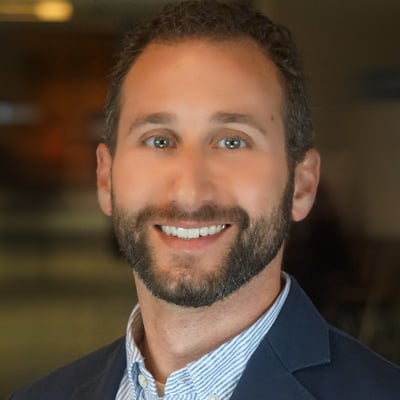In the fall of 2020, we were fortunate enough to sit down with Joe Giallanella, the Team Lead of the Growth Incubator at Seventh Generation, a global consumer product goods company and veteran B Corporation. At the time, and amidst the unprecedented circumstances of a global pandemic, Joe’s team had just finished up the successful launch of Zero Plastic Homecare, an innovative new line of products aimed at eliminating plastic entirely from home care product packaging. The successful launch only served to further prove the resilience and humanity that underlies what it truly means to be a B Corp.

Check out our conversation with Joe below:
KSV: Tell us a little bit about your current role at Seventh Generation.
Joe: I've got a really fun role, where my job is to lead a team that's trying to identify the next transformational idea for Seventh Generation. This can come in the form of new product innovation, or maybe new channel entries, both things that we are currently pursuing. But really what I'm trying to do is foresee 2025 and ultimately what Seventh Gen will look like then, how consumers will interact with our products, and what the consumer behavior and consumer needs will be.
To do that, my work is to develop MVP – or minimum viable products – to place in the market to gauge consumer interest and willingness to adopt. Rather than testing in house for several years, building a product and then hoping it sticks, we move the product development up and research out into the marketplace to leave it up to consumers to decide what they are interested in.
KSV: Is the Growth Incubator a relatively new idea? Is it a new iteration of this type of future planning or has it been around for a while?
Joe: It's something that I was fortunate enough to start in mid-2019 to outfit Seventh Gen to be able to do things in a nimble fashion and get MVP products into the marketplace quickly, by breaking free from the layers of bureaucracy, if you will, within a Consumer Product Goods (CPG) company.
It is a cross-functional group of really talented individuals that sits outside of that traditional makeup, and I really treat it as a group of generalists. Even though everyone comes in with a cross-functional area of expertise, the team is built in the mode of a startup in that people will wear many hats and need to deliver beyond just what their core competency is in order to bring a platform to life.
KSV: You've had a pretty lengthy career in the CPG arena, working with and for various brands. So how do you think that your experience has really given you the tools and resources to build out this Growth Incubator and to help lead the team?
Joe: I was in the finance world years ago and wanted to get into product creation and into CPG. At that point I decided to go back to school to make the transition. I was fortunate enough while there to learn from a professor, Ed Freeman, who was the founder of the Stakeholder Theory of creating value. In the '80s he pioneered this thinking that in order to create true value you need to think about all stakeholders in the process of delivering product as opposed to just shareholder value trickling down to others. You must consider the impact on others that a product has in its production, delivery, and usage. And even at that point, one must think about the environment as a key stakeholder in the process.
It was with that learning and a desire to align my work with my personal values, that I was fortunate to find a company like Seventh Gen that shares similar values and had been structured around that stakeholder theory model from the beginning.
Like you said, coming from other CPG companies and the work that I'd done previously, my passion for innovation and building products that I can find on the shelf at the end of the day was clear. That gives me a lot of fulfillment, and what I like to do now after having developed dozens of products is pull those two things together; great innovation that also delivers a positive impact to all stakeholders involved.
KSV: So true and such a good way of future-planning! And it ties really well into the next question. Seventh Generation is a B Corp, they've been a B Corp for quite some time and have really embodied its philosophies. But how do you see the core aspects of being a B Corp come through in day-to-day operations?
Joe: It certainly goes beyond where the Growth Incubator is today. It is in the fabric of Seventh Gen, which has been in business now for over 30 years. Seventh Gen was the first to remove phosphates from Auto Dish products, recognizing that what goes down the drain could be harmful to waterways, or the work that the team did to advocate for ingredient disclosure on home care products prior to that law that was recently passed in California. And Seventh Gen has been on a crusade for the last 15 years around putting more post-consumer recycled plastic into its plastic packaging, so much so that we've achieved 100% on a number of our products to date.
So that triple bottom line (people, planet, AND profit) is something that is embedded in the fabric of Seventh Gen. As I think about our Growth Incubator group, we're looking at a way in 2025 to be cleaning without the use of plastic and the implications, not just from a profit standpoint of that new product line, but how it can have impacts on society and on our environment as well. So it is really feeding back to the triple bottom line mantra within Seventh Gen, and that is paralleled with what we stand for as a B Corp.
KSV: The aspect of innovation has really helped Seventh Generation lead the charge in a sustainable product market where there are a lot of competitors. The Zero Plastic Homecare line is just an example of the innovation that your team has brought forward. Could you talk a little bit about some of the challenges, expected or unexpected, that the team came up against in order to bring the line from initial stages to its launch, with the huge caveat that nobody was planning on a pandemic happening the same summer that you were trying to launch this brand-new product.
Joe: I think in developing this innovative, new product lineup we're anticipating that not everything is going to go right. This is done in a rapid fashion on purpose, so we know from the beginning not everything is meant to be perfect. And like you said, we weren't predicting anything about what happened in 2020 but we were trying to fast track this as quickly as possible.
Recognizing that there may be packaging hurdles, like moisture barrier concerns, or – because we are working on items that don't include any liquid – seeing our powder clump or not fully dissolve in development were a few issues to work around. All of that from a technical build perspective was anticipated and we were prepared to account for it all.
But yes, I would say that the extent of the delays that occurred because of COVID were certainly unforeseen and required us to pivot and think through the supply chain and think through how we're going to continue down the path of getting to launch as quickly as possible.
And as we reflected during the summer of 2020, yes, we were hoping to be out a little bit earlier, but I think what COVID-19 and the quarantine really highlighted was that there is an inextricable link between human impact and the environment. When people are at home and not out commuting, and manufacturing ceased, there were fish seen again in the Venice Canal, and the air quality in most of India had cleared up for a substantial amount of time.
So, as we then rolled out this new product line as folks were able to reflect and see society’s impact within the environment, we were able to underscore our statement, saying, "Hey, the plastic crisis is not going to go away. In fact, during this period, there's probably been even more single use products being utilized. Here's a solution that we're coming out with,” both within the Zero Plastic line, but also a new way for people to be cleaning.
And that again, gets back to our desire to test consumer behavior and willingness to adopt. And so as people were at home in quarantine, cleaning more often, this was really a timely moment to come out with Zero Plastic Homecare.
KSV: Did you feel like you had to do a certain level of consumer education around this new product line or do you think there was kind of base level of awareness on the real key differentiators? What made it so special?
Joe: We were pleasantly surprised at how ready consumers were for a plastic-free option. We saw in the research that one in three consumers go to a grocery store hoping to buy their products in something other than plastic, but unfortunately the existing options don’t allow them to make those decisions.
We did plan for a little bit more time for consumers to be willing to try at the extent that we've seen or change behaviors around cleaning. But what we've seen right out the gates has been a readiness and almost pent-up energy around this.
And maybe it goes back to the point around the timing of this during the quarantine and pandemic health. But we have been pleasantly surprised by the pace with which adoption has occurred and people willing to shift some behavior because they want to make a difference, because they recognize that, yes, the plastic crisis is here to stay unless we do something about it.
KSV: That sparks another question: a lot of success for this type of product line and future innovations relies on expanding your audience base. It means not only ensuring that sustainable products can continue evolving, but that you’re also not just speaking to the moms or the parents or the millennials. You want to make sure you’re also speaking to the next generation of future consumers. What do you think Seventh Generation is doing to help ensure and inspire those next generation of sustainable buyers?
Joe: Yes, what we're seeing, particularly from Gen Z, is that they want to purchase from companies that reflect their values. And Gen Z is growing up as a group of activists and environmentalists, and recognizing that there is only one planet, there's “No Planet B.” And that we need to do all that we can to shift the tide of what's gone on in the past 60 years of this single-use, disposable mentality. When they're seeking options, they're going to look to companies that have that similar mindset and are providing products that align with what they're after.
So, this experience over the past year has underscored for me that it's okay for companies to be outspoken about their aspirations, but it's really important for their actions to follow those ambitions. Seventh Gen has done a good job of putting a stake in the ground and saying, "We're going to get to this goal by 2020, and to this one by 2025" and the company then follows through by making meaningful shifts in our business and sharing that back with consumers so that they can see and recognize that our values are indeed aligned.
---
Thanks so much, Joe! You can learn more about the Zero Plastic Homecare line here, and learn more about Seventh Generation’s commitment to social and climate justice here.
